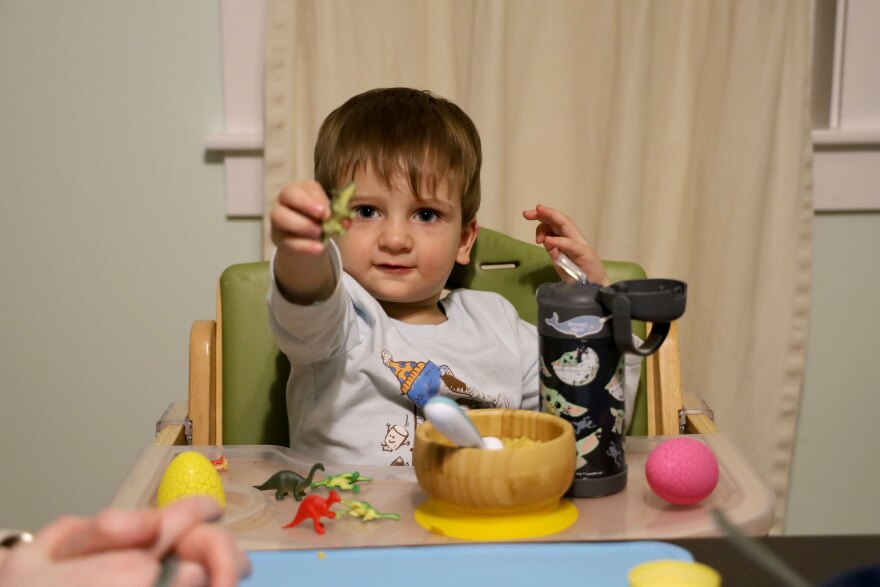Brigid and Mattie Black are playing with their two-year-old son Bennett at their home in Saco, hiding toy dinosaurs in plastic eggs. Joy explodes across his face when he finds his favorite...
“A tetradactyl!" he yells in excitement.
Mattie and Brigid are married, and they conceived Bennett with the assistance of a sperm donor. Mattie gave birth to him in January of 2022.
"He calls me Momo," Mattie said.
"And I'm mama," Brigid said.

After the Supreme Court overturned Roe v. Wade, the couple feared that a conservative shift could erode rights for LGBTQ people, including Brigid’s parenting rights.
"As the non gestational carrier, I just felt like I had to do whatever it took to secure parent rights to Bennett," Brigid said. "So there's never any question [and] nobody can take those parent rights away from me."
So, the couple decided that Brigid should get a second-parent adoption decree. Brigid said the judge presented unnecessary obstacles during the process, asking both Brigid and Mattie to get background checks, even though it wasn’t required for both. And their sperm donor had to complete an affidavit saying she was Bennett’s parent, despite already having a contract.
“He's not involved as a parent in anyway," Brigid said. "So you know, that just feels redundant and frustrating. And kind of insulting.”
Other Maine families report facing similar hurdles in court, some judges even requiring waiting periods and home inspections. While these are normal steps for a standard adoption, LGBTQ parents say they are unnecessary and invasive hoops to jump through to adopt their own child.
"It kind of felt like I was just a fresh… like I was a stepparent coming in to adopt a child who was kind of relatively new to the picture. Whereas I've been Bennett’s parent since the very beginning. You know, we dreamed Bennett, we conceived him," Brigid said. "It just felt like a situation that maybe didn't quite apply to what I was doing."
In October a new law went into effect in Maine that streamlines the process securing legal parenting rights for LGBTQ couples using assisted reproduction. It’s called confirmatory adoption.
"It removes some of the burdens that previously existed," said Eviana Englert, an attorney at Bernstein Shur in Portland.
Englert said the new law just requires families to fill out a few forms in country probate court and pay a $65 filing fee.
"You just need to submit a petition that includes like the child's birth certificate, and explanation of the circumstances of the child's birth through assisted reproduction and just an attestation that there are no competing parentage claims in existence from somebody else," Englert said. "It becomes a lot more accessible for people and to be able to get that safety and security of an adoption decree in a way that's a lot more affordable."
Englert recommended that families consult a lawyer with any questions about the new confirmatory adoption process.
Maine is just the eighth state in the country to pass a confirmatory adoption law. At least one state, New York, currently has a pending confirmatory adoption bill. But legal parenting rights for the non-biological parent are still not guaranteed in many parts of the country. A 2023 report found an urgent need for states to update their outdated parentage laws, citing the impact on children's wellbeing.
"In the past year, a number of state courts have stripped a marital LGBTQ parent of their parentage," said Polly Crozier, the director of family Advocacy at GLBT Legal Advocates and Defenders. "So a court in Oklahoma, a court in Pennsylvania, a court in Idaho said a child born into an LGBTQ marriage is not the child of the non-biological parent. That is very frightening. But if you have an adoption, you are totally secure to your child."
Crozier said Maine has been a leader in inclusive parentage laws, providing legal protection for LGBTQ parents through several laws in the last decade, including presumed parentage for married couples and an ‘Acknowledgment of Parentage’ form, which gives parents legal protection in Maine.
But, Crozier said, many families still want an adoption decree, so they’re protected when they travel to another state.
"Unfortunately, worst case scenarios happen. And you get challenged," she said. "I myself have been challenged at an airport... Where's your children's father? It's like, Nope, I'm going to pull out my adoption decree, pull out my marriage certificate, pull out their birth certificates. I think many people don't understand that for many LGBTQ parents, there's really that feeling of anxiety and fear quite a bit."
In recent months, several new LGBTQ parents in Maine said the confirmatory adoption process was very straightforward and made them feel more secure. Like Englert, who just gave birth in February.
"It sends a really clear message - you are just as much of a family as everyone else in this state, and you deserve the same rights and protections and also deserve to like obtain those rights and protections in a way that's not burdensome or invasive or intrusive or offensive," Englert said. "It makes my family feel really seen."

Brigid and Mattie Black said they want to have another baby someday, and Mattie said the new law provides relief.
"It does feel a bit like a weight coming off our shoulders to be like, it's cheaper and easier. And … there's less question of like, is some judge gonna say no, to her adopting her own child?" Mattie said.
Brigid testified in support of the confirmatory adoption bill last summer. She said she's proud that she could play a small role in helping other LGBTQ families in Maine.
"We're just people looking to have and raise families and that's a universal thing," Brigid said. "That shouldn't divide us, that should be something that pretty much unites everybody."



